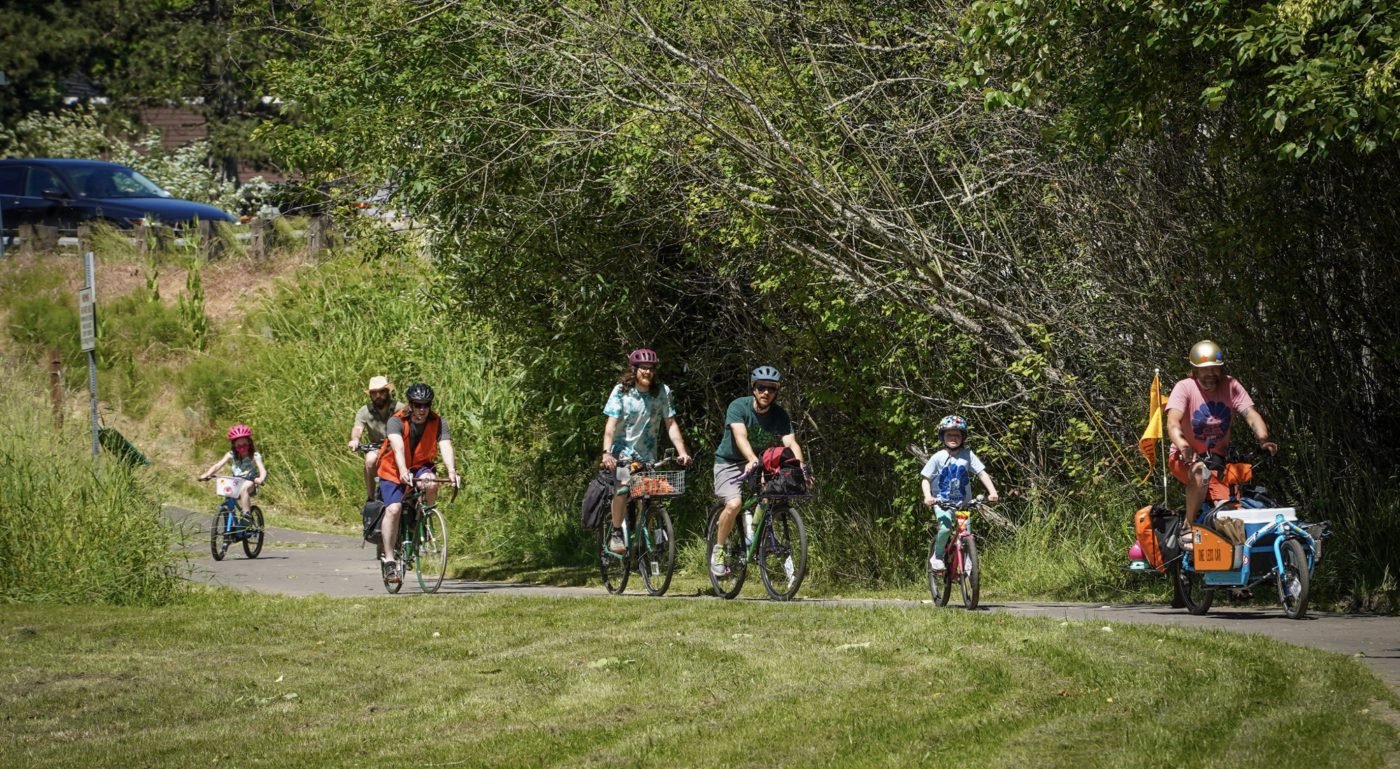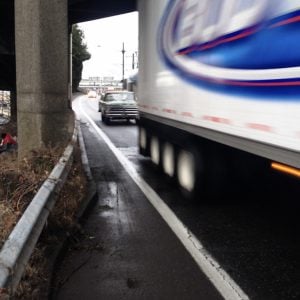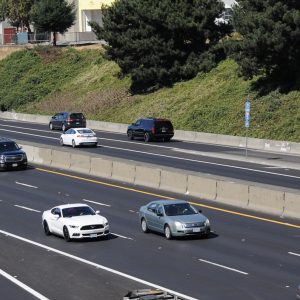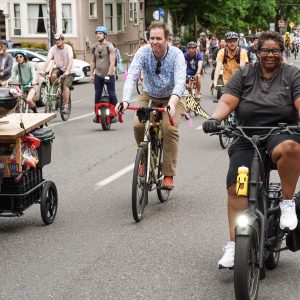
Oregonians are flooding the voicemails and inboxes of state lawmakers in hopes of reminding them that something left out of the big transportation bill is worth funding: off-street, walking and cycling paths.
When some path advocates looked through the 102-page House Bill 2025, they were dismayed to find that the Oregon Community Paths Program was nowhere to be found. Now, with support from Joint Committee on Transportation Reinvestment Co-chair Senator Chris Gorsek, they’re pushing a new luxury tax on expensive cars to help the program meet demands.
“Trucks or ducks? Where would you want your kids to ride? Tell lawmakers not to delay in investing in the off-street paths our communities deserve!” reads a graphic from the nonprofit Oregon Trails Coalition that features an image (below) of a semi-truck on Columbia Boulevard next to a child riding on the Columbia Slough Path.
The Oregon Community Paths (OCP) Program was established in 2017 when the previous transportation bill created the Multimodal Active Transportation Fund and filled it with revenue generated by the $15 bike tax and a portion of Oregon Lottery proceeds. Since 2017, ODOT has added funding from the Federal Highway Administration and a portion of a statewide tax on car dealers to bolster program resources. Grants are awarded every other year. In its first year (2021), the program awarded $11.3 million to 21 projects across the state. In its second year, $37 million was awarded. While that sounds like good news, keep in mind that for every dollar the program awarded in its first two funding cycles, four dollars in project applications were denied. This year, the Oregon Department of Transportation says they have $61 million to allocate and they’ve had over $120 million worth of project applications.
House Bill 2025 as it was released last week included no new funding for the OCP program, which means demand for these projects will continue to outstrip demand. The lack of new funding was surprising given that the bill framework released back in April mentioned the OCP and included very positive language about the need to fund them. That initial proposal sought an increase in the bike tax which ostensibly would have led to a commensurate boost to the OCP Program; but when the bill finally came out last week, the bike tax increase was off the table.
Given the myriad benefits of providing safe places for Oregonians to walk and roll without the stress of drivers and their cars, path and trail project advocates say the time is now to increase funding.
“We cannot accept a transportation package that puts hundreds of millions of new transportation dollars on the table while making zero attempt at addressing the funding shortfall for Oregon Community Paths!” exclaimed Oregon Trails Coalition Executive Director Steph Noll in an email to BikePortland last week.
Instead of increasing the existing bike tax, Noll and other groups — along with hundreds of their supporters — have been busy in the past week writing letters to lawmakers asking for support of a luxury vehicle tax. Path and trail advocates have joined forces with environmental, energy, and electrification nonprofits to push for a 4% luxury tax on vehicles that sell for over $75,000. Revenue from the new tax would fund the OCP Program and vehicle electrification initiatives.
Marisol De La Torre, a legislative advocate with Oregon Just Transition Alliance testified in support of the tax at a public hearing on HB 2025 last week. She told lawmakers it’s not fair when higher taxes and fees hit lower-income communities. “Those with the means must pay their fair share,” De La Torre said. “We are encouraged by the idea of a luxury vehicle sales tax.”
Rogue Climate Legislative Coordinator Zoe Serrano told lawmakers via testimony on the bill that, “It’s time to get creative with ideas like the 4% luxury vehicle tax that calls on those who can afford it most to invest in safe, healthy, connected communities across Oregon.”
Noll says an official amendment to HB 2025 is forthcoming, but I haven’t seen it posted yet. The language is expected to spell out that one-third of revenue generated by the new tax would go to OCP Program (via Multimodal Active Transportation Fund) and the remaining two-thirds would go toward electric vehicle incentives and charging infrastructure. (A group of Democrats are pushing a SMART Framework that would raise $20 million per year for the OCP Program.)
Given that HB 2025 already seeks to impose a 3% tax on new cars (a 1% vehicle privilege tax and a 2% transfer tax on new vehicles), the additional luxury tax would put a 7% tax on new luxury vehicles. Proponents of the concept say this would put Oregon on part with nearby peer states like Connecticut, Idaho, Montana, and Nevada, who have similar new car taxes of 7.75%, 6%, 11% and 8% respectively.
After hosting three public hearings for HB 2025 last week, the legislature is continuing to debate and negotiate the bill. Stay tuned for more coverage.








Thanks for reading.
BikePortland has served this community with independent community journalism since 2005. We rely on subscriptions from readers like you to survive. Your financial support is vital in keeping this valuable resource alive and well.
Please subscribe today to strengthen and expand our work.
Duck (?) duck (?) goose!
I love this idea!
But stand by for the whining of the privileged – how this tax is unfair to them and if they have to pay a tax, it should benefit only the road surfaces they drive on.
Would this tax affect you or are you just willing to have others pay the freight for public goods.
Let’s see if De La Torre understands what either the word “fair” means or “share”.
At a purchase price of $80k, with a reasonable loan term, current interest rates and standard personal financial advice of having your car payment be around 10% of net take home pay, this is targeting people making around $300k per year, a group that already pays more in income taxes than about 95% of all Oregon residents.
Amazing the cognitive dissonance this position requires.
I wish this were true on a percent of income/wealth-basis but, unfortunately, the rich have tax credit/deferment/shelter after tax credit/deferment/shelter that makes them grossly under-taxed.
Not at $300k and not in Oregon.
Of course that demographic pays more in income taxes than 95% of all Oregon residents; they make more income than 95% of all Oregon residents!
What a stupid, bad faith take. *ahem* Excuse me, rhetorical question with a heavily implied point.
I submit to you that high income households in the 95th percentile could choose to not buy a luxury car if such a tax would be so bank-breaking.
It’s a stupid/bad faith argument to suggest that people who pay more in taxes than 95% of people are, in fact, likely paying their fair share, particularly somewhere like Oregon with such a progressive tax structure?
Likewise it is ignorant and stupid to argue people aren’t paying their fair share of taxes when you have no clue!
I thought the standard advice was that your car should cost about as much as your most expensive bike.
That’s what it is in my social circle.
This is actually great advice.
If you want poor people to pay more in taxes, pay them higher wages.
Every vehicle should be taxed on luxuries like excess weight, size, acceleration and top speed. These are the elements that society ends up paying for, and focuses the argument on what is “fair” and good policy.
Fair enough but these cars don’t impact the subject matter here.
The comments in this blog on tax policy reflect the long held Oregon view you can just spout that the wealthy don’t pay their share. Let’s have some facts in Multnomah County, at time of adoption roughly 5000 households were funding the Metro Supplemental Housing Services and Preschool for All tax. I am happy to pay those taxes for the value they add, but here’s the deal, everyone needs skin or finances in the game for functions that benefit all. It is bad policy that the minority gets hit every time a special interest wants something. Perhaps that’s why companies are leaving Oregon and it is reported people are moving out of Multnomah County. Everyone should pay a fair share for public goods.
Just tax the other guy! This is the Oregon motto. At the time they were enacted, the Metro Supplemental Housing Services and Preschool for All measures were paid for by roughly 5000 households in the Metro area. Would love for those supporting yet another tax they won’t pay to prove with facts that families in Oregon with higher income aren’t paying their fair portion of taxes. I think you take heart in saying others don’t pay their fair share but have zero data to support your claim. Bike paths etc are a general public good that should be funded from the general fund, not yet another specialized tax.